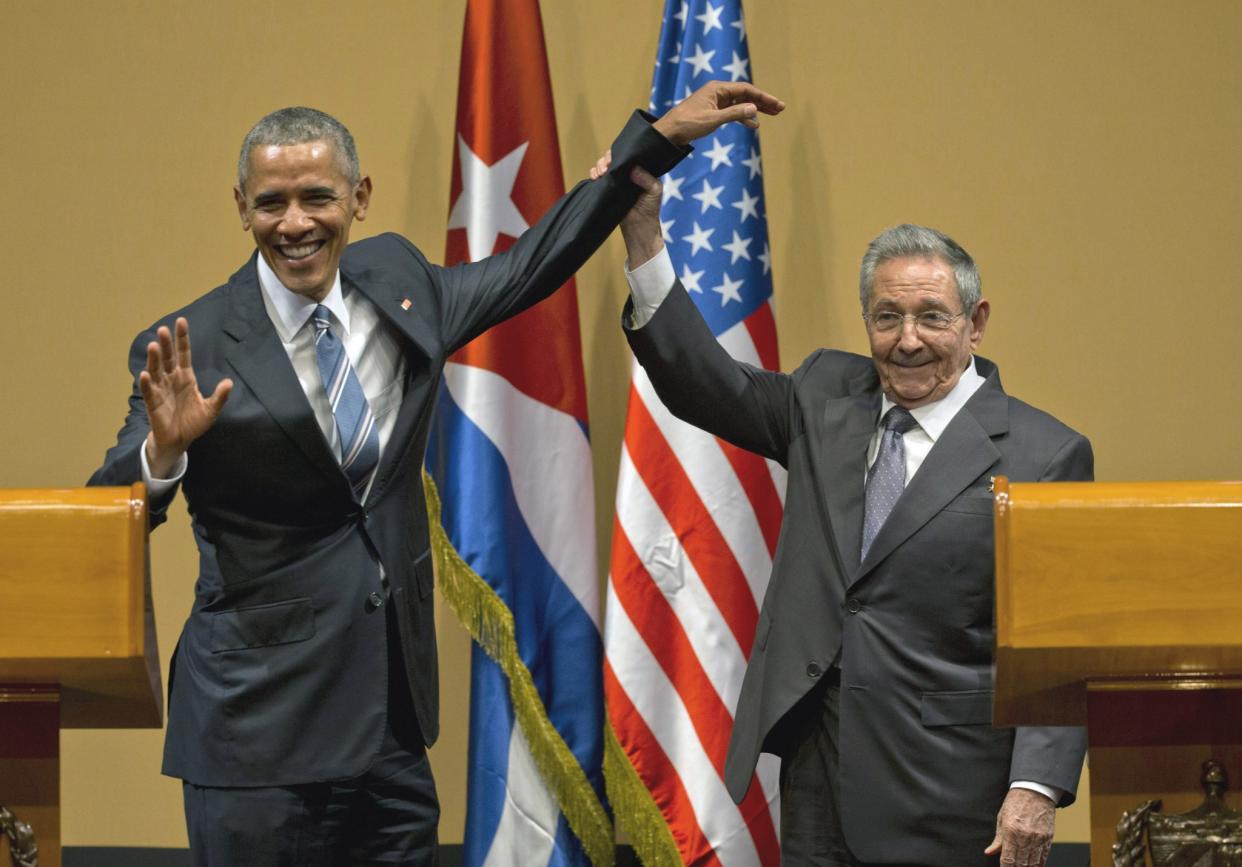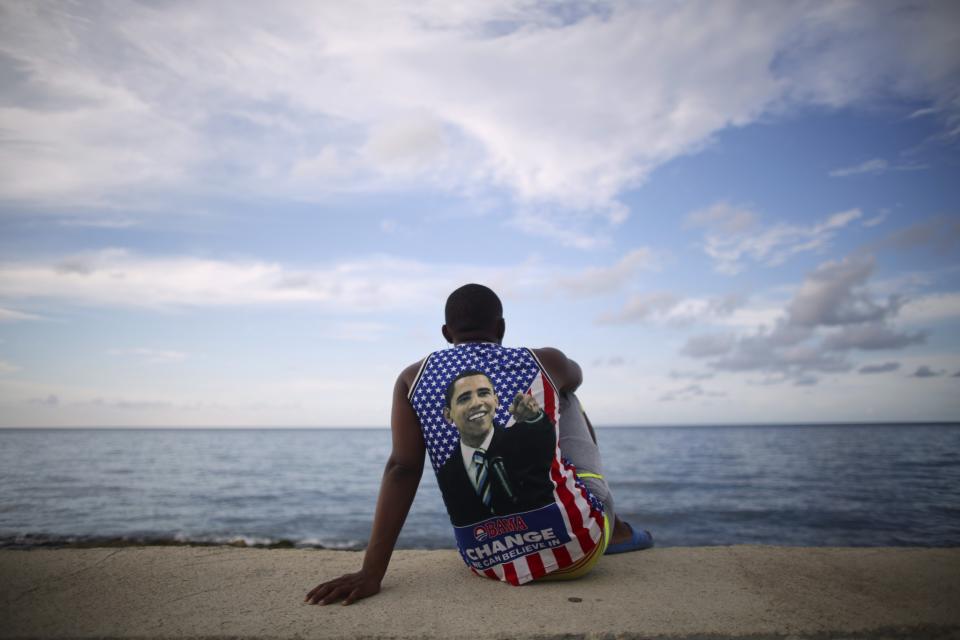Obama’s Last 100 Days: Cuba and Castros edition

Ever since the administration of President Franklin Delano Roosevelt, presidents have been judged on the successes they notch during their first 100 days. Now, as Barack Obama prepares to end his star turn on the political stage, Yahoo News is launching The Last 100 Days, a look at what Obama achieved during his consequential presidency, how he navigates the struggles of his final months in office and what lies ahead for him after eight years filled with firsts. And we will look at how country bids farewell to its first African-American president.
It won’t all be about policy. As Obama himself is fond of noting, he also spent his two terms as father to daughters Malia and Sasha and husband to first lady Michelle Obama. And even without much input from the White House, the cultural landscape shifted dramatically over his two terms on issues such as gay rights.
And then there’s the way the president sees the presidency — not just his own tumultuous years at 1600 Pennsylvania Avenue but also the institution and its relationships (for better or worse) with other branches of government and the news media.
This is the second installment, looking at Obama’s historic outreach to Cuba, 160 days before he leaves office.
_____
President Obama will make a fresh push in his final months in office to invigorate his historic opening to Cuba, using executive power to promote commercial and cultural exchanges; pushing Congress to act on easing travel restrictions; prodding the Castro regime to make good on pledges of reforms; and probably taking the potentially risky step of nominating an ambassador to Havana, senior officials say.
Obama will encourage private sector investment in U.S.-Cuban relations, as well as interest from American nonprofits in projects on the island — one example being efforts by Catholic groups in the States to preserve symbols of Cuba’s Catholic heritage. And he will encourage developments already in the works, such as the inauguration of direct flights from U.S. airports to Cuba, expected to begin in late August or early September.
The goal is to make the process of eliminating the last vestiges of the Cold War in the Western Hemisphere “irreversible,” aides say. The president will renew his call for Congress to lift the decades-old U.S. embargo on Cuba, though he does not expect lawmakers to act before he leaves office in late January.
Obama announced a new era in U.S.-Cuba relations on Dec. 17, 2014. On Aug. 14, 2015, Secretary of State John Kerry reopened the U.S. Embassy in Havana, more than five decades after Washington broke off relations in the aftermath of the revolution that swept Fidel Castro to power.

But one year after Kerry watched the Stars and Stripes rise over the outpost in the Cuban capital, the president has yet to nominate an ambassador, an important symbolic step. For months, aides have privately debated whether the downsides of doing so outweigh the upsides: Congressional opponents of Obama’s policy would seize the opportunity to use confirmation hearings as a stage from which to denounce any thaw with Havana, and then block the nominee. The career diplomat currently in charge at the embassy, Chargé d’Affaires Jeffrey DeLaurentis, has done a stellar job, administration officials say. Passing him over would be a poor reward, but so would exposing him to what is sure to be partisan vitriol with feeble prospects for confirmation. Obama aides were bearish on a nomination because it’s one of the easiest things for just one senator — a Ted Cruz or a Marco Rubio, for example — to block.
But now, a top administration official told Yahoo News, Obama is leaning toward making a nomination.
“I think it’s likely that we’ll have an ambassador to announce,” a senior administration official told Yahoo News on Thursday, before adding, “I don’t think we’d be optimistic about the confirmation process.”
It’s not clear who Obama would pick if he chooses this course. Names floating around Washington have included DeLaurentis or even Carlos Gutierrez, who served as commerce secretary under President George W. Bush and has converted from anti-Castro hard-liner to supporter of the current president’s policy.
While confirmation is thought to be a lost cause this year, administration officials note that Obama’s policy is broadly popular, and say that a Republican refusal to confirm a respected career diplomat like DeLaurentis, or one of their own like Gutierrez, would only hurt the GOP.
An ambassadorial nomination would likely be the highest-profile development on Cuba policy between now and Jan. 20, when Obama leaves office. The White House isn’t seriously looking at inviting Cuban President Raúl Castro, according to one senior administration official. “We have not had discussions about that. Nor have they raised it with us,” the official said.
But aides are looking at smaller but still significant victories that they hope will edge the policy forward.
Some of the new steps would be in the form of executive actions.
“I think we have one more round of regulatory changes in the pipeline,” likely coming in the fall, the official said.
Like a previous round of changes, they would probably involve interpreting existing statutes to make it easier for Americans to visit Cuba despite a formal U.S. ban on tourism, and to pave the way for greater commercial ties. “We are looking at what is permissible under the law,” the official said.

The administration will also try to publicize changes already made, such as loosening limits on some dollar-denominated transactions in Cuba. Officials believe that more U.S. banks could take advantage of these rules, for example, to make it easier to use credit cards on the island.
“People just don’t understand” some of the new policies, the official said.
Government agencies have sometimes hindered more than helped. After significant badgering by the U.S.-Cuba Trade and Economic Council, which favors closer ties, the Transportation Security Administration finally confirmed to the group on Aug. 9 that U.S. air marshals would be on board some flights to and from Cuba. But the agency did not post the news on its website or its Twitter account. And repeated efforts by Yahoo News to obtain the statement from the TSA public affairs staff were unsuccessful.
On the legislative front, administration officials say they will keep pushing Congress to lift the ban on Americans traveling to Cuba as tourists, and to enhance credits that permit Havana to buy U.S. agricultural goods. The Senate Appropriations Committee has approved measures reflecting both priorities, but it’s unclear whether the House will follow suit.
“We plan to test how far we can get on these legislative efforts,” the senior official said.
Obama has no plans for a return trip to Cuba, but senior officials like Kerry will travel there to press the case for Havana to make more progress on embracing free-market reforms and respecting human rights.
When it comes to advancing the policy and pushing for change in Cuba, the official said, “we have to finish strong.”
_____


